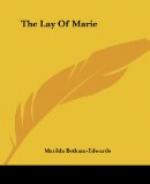Les contes ke jeo sai rerrais,
Dunt li Bretun ont fait ces
lais,
Vus conterai asez briefment,
&c.
The Lays are twelve in number; nine of which, with the above introduction, are extracted, with some trifling abridgment, from the Specimens of early English Metrical Romances, by George Ellis, Esq.; the two in verse from Way’s Fabliaux; and the other from the notes to Sir Tristrem, by Walter Scott, Esq.
No. 1.—The Lay of SIR GUGEMER, or GUIGEMAR.
While Arthur reign’d,
(so chim’d, in earlier day,
Loud to the twanging harp
the Breton lay,)
While Arthur reign’d,
two kingdoms born to bless,
Great Britain’s king,
and suzerain of the less;
A lord of Leon, one of fair
report
Among the vassal barons of
his court,
Own’d for his son a
youth more bravely thew’d
Than aught both countries
yet had seen of good.
Dame Nature gave the mould;
his sire combin’d
Due culture, exercise of limbs
and mind,
Till the rare strippling,
now no longer boy,
Chang’d his fond parents’
fearful hope for joy.
His name was Gugemar:
as strength grew on,
To Arthur’s court the
sire consign’d his son.
There soon in feats of arms
the youth excell’d,
Magnanimous, in sports, or
deadly field.
Chief of the Table-round,
from time to time
Illustrious Arthur mark’d
his opening prime,
Then dealt him noble meed;
the honour high,
From his own hand, of glorious
chivalry.
Knightly in arms he was; one
grievous blot,
So deem’d full many
a courtly dame, I wot,
Cross’d the full growth
of his aspiring days,
And dimm’d the lustre
of meridian praise:
With bootless artifice their
lures they troll’d;
Still, Gugemer lov’d
not, or nothing told.
The court’s
accustom’d love and service done,
To his glad sire returns the
welcome son.
Now with his father dwelt
he, and pursued
Such pastimes as are meet
for youth of noble blood.
The woods of Leon now would
shrilly sound
Oft with his joyous shout
and choral hound
At length, one morn his disadventurous
dart,
Lanc’d, as the game
was rous’d, at hind or hart,
Wing’d through the yielding
air its weetless way,
And pierc’d unwares
a metamorphos’d fay.
Lo! back recoiling straight,




